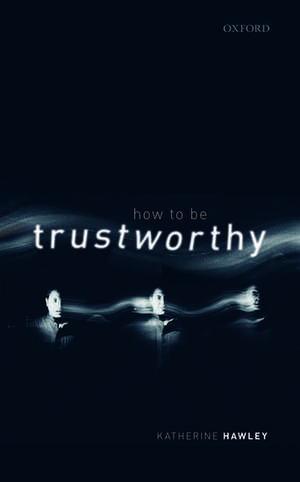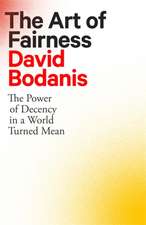How To Be Trustworthy
Autor Katherine Hawleyen Limba Engleză Hardback – 26 sep 2019
Preț: 240.99 lei
Nou
Puncte Express: 361
Preț estimativ în valută:
46.11€ • 49.31$ • 38.45£
46.11€ • 49.31$ • 38.45£
Carte disponibilă
Livrare economică 17-22 martie
Preluare comenzi: 021 569.72.76
Specificații
ISBN-13: 9780198843900
ISBN-10: 0198843909
Pagini: 176
Dimensiuni: 144 x 224 x 15 mm
Greutate: 0.48 kg
Editura: OUP OXFORD
Colecția OUP Oxford
Locul publicării:Oxford, United Kingdom
ISBN-10: 0198843909
Pagini: 176
Dimensiuni: 144 x 224 x 15 mm
Greutate: 0.48 kg
Editura: OUP OXFORD
Colecția OUP Oxford
Locul publicării:Oxford, United Kingdom
Recenzii
Hawley's work is enjoyable to read, rich as it is with vivid examples and careful explication of technical philosophical terms from the various subdisciplines from which she draws ideas. The book reads as an introduction to several facets of the scholarly literature on trust even while waging a novel argument about what trust and trustworthiness consist in. Having used thebook in an upper division undergraduate course in 2020, I can recommend it for teaching, and there is no doubt that the conception of trust on offer here is one that must be cited in the trust literature going forward.
The appeal of Hawley's work is her expert ability to highlight complex issues related to trust and trustworthiness that lie at the intersection of ethics and epistemology. Moreover, these philosophical issues are familiar to us as ones we encounter and navigate in our routine social interactions. The breadth and clarity of the issues covered will interest readers looking to critically reflect on trust concepts and how they might operate in the social world.
How to be Trustworthy is a highly readable and thought-provoking study of trust and trustworthiness that is philosophically and conceptually sophisticated. It is a must-read for anyone interested in the philosophy of trust and social epistemology more generally, one that encompasses a much broader range of social and cognitive phenomena that are relevant to this topic than is usually recognised.
The appeal of Hawley's work is her expert ability to highlight complex issues related to trust and trustworthiness that lie at the intersection of ethics and epistemology. Moreover, these philosophical issues are familiar to us as ones we encounter and navigate in our routine social interactions. The breadth and clarity of the issues covered will interest readers looking to critically reflect on trust concepts and how they might operate in the social world.
How to be Trustworthy is a highly readable and thought-provoking study of trust and trustworthiness that is philosophically and conceptually sophisticated. It is a must-read for anyone interested in the philosophy of trust and social epistemology more generally, one that encompasses a much broader range of social and cognitive phenomena that are relevant to this topic than is usually recognised.
Notă biografică
Katherine Hawley is Professor of Philosophy at the University of St Andrews, where she formerly served as Head of School of Philosophical, Anthropological, and Film Studies, and as editor of The Philosophical Quarterly. Her research spans metaphysics, epistemology, and ethics, and she has written articles on identity, indeterminacy, social groups, and mereology. She is the author of How Things Persist (Oxford 2001) and Trust: A Very Short Introduction (Oxford 2012), and also the co-editor of Philosophy of Science Today (Oxford 2012).




